International Human Resource Management: A Detailed Report
VerifiedAdded on 2020/05/08
|5
|1015
|71
Report
AI Summary
This report on International Human Resource Management (IHRM) addresses the issue of employee attrition following international assignments. It identifies that the challenges of adjusting back to home offices and different corporate cultures, after working in culturally diverse environments, leads to employee frustration and turnover. The report emphasizes the role of IHRM managers in mitigating these issues. The report suggests that proactive measures such as pre-departure training and ongoing development programs can improve employee adaptability and reduce early returns. It also highlights the importance of incorporating employee's experiences and knowledge gained from international assignments back into the organization to increase employee motivation and reduce repatriation rates. The report emphasizes the need for IHRM managers to focus on training and development, cultural awareness, and the integration of repatriated employees' skills to enhance organizational effectiveness.
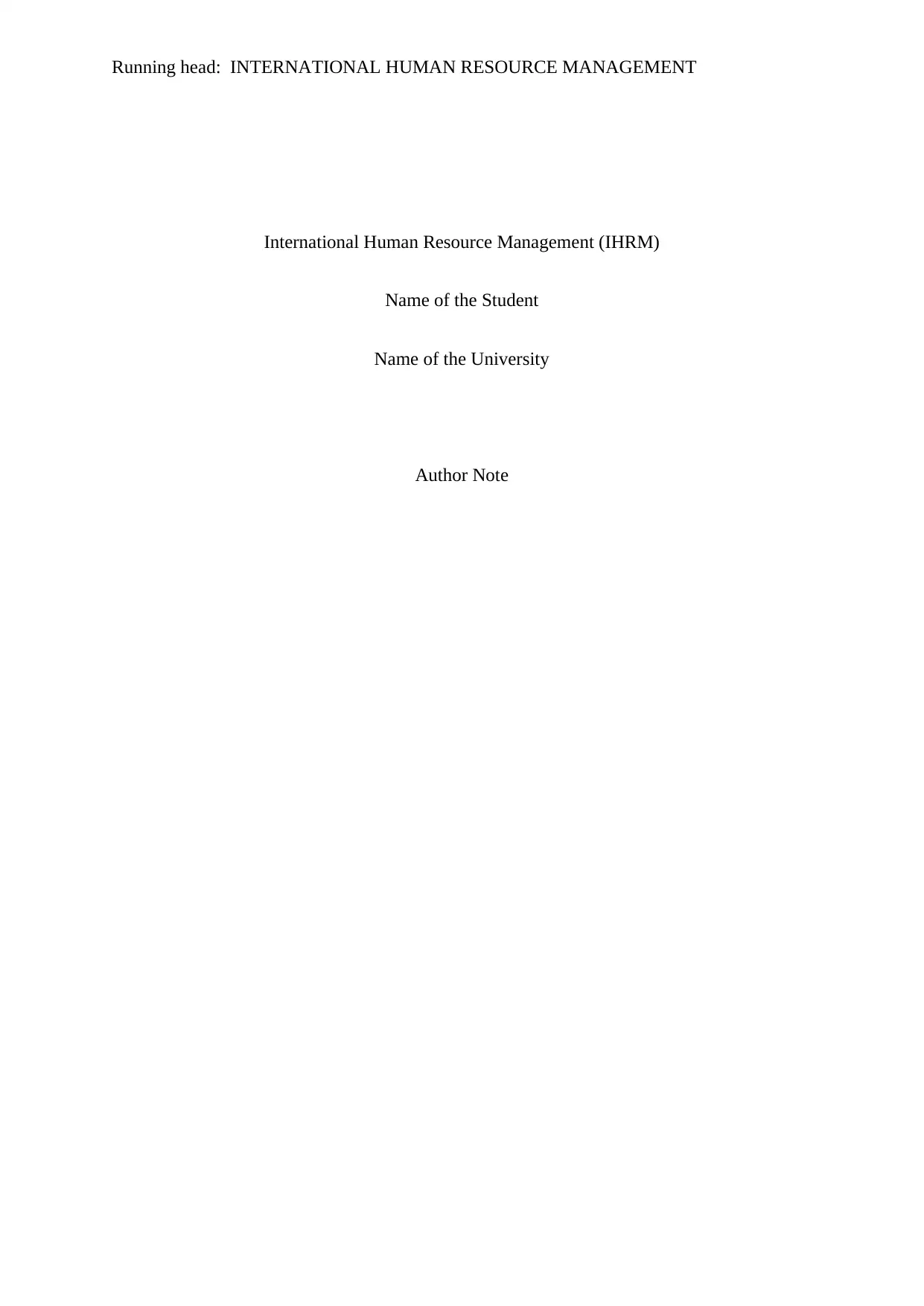
Running head: INTERNATIONAL HUMAN RESOURCE MANAGEMENT
International Human Resource Management (IHRM)
Name of the Student
Name of the University
Author Note
International Human Resource Management (IHRM)
Name of the Student
Name of the University
Author Note
Paraphrase This Document
Need a fresh take? Get an instant paraphrase of this document with our AI Paraphraser
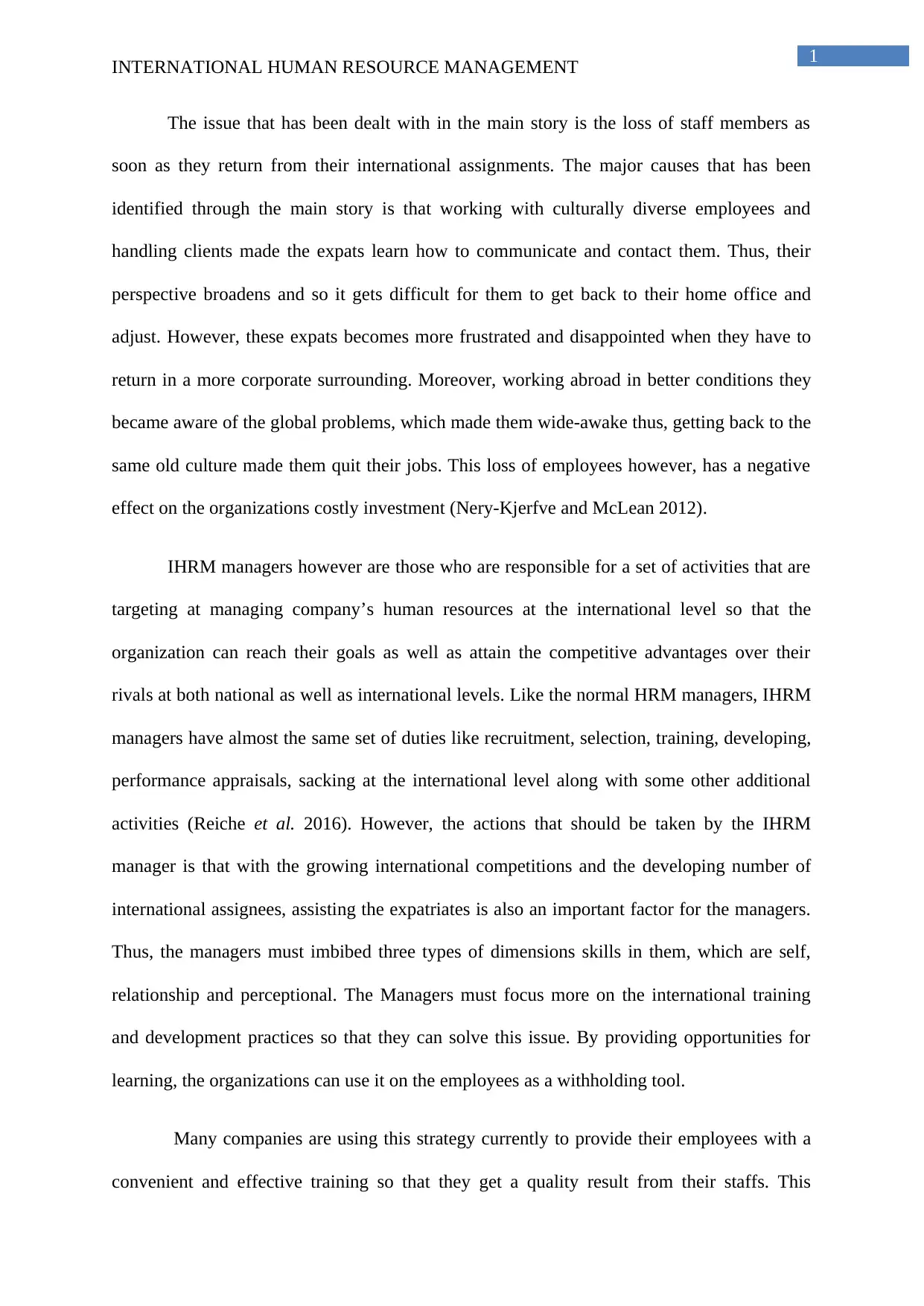
1
INTERNATIONAL HUMAN RESOURCE MANAGEMENT
The issue that has been dealt with in the main story is the loss of staff members as
soon as they return from their international assignments. The major causes that has been
identified through the main story is that working with culturally diverse employees and
handling clients made the expats learn how to communicate and contact them. Thus, their
perspective broadens and so it gets difficult for them to get back to their home office and
adjust. However, these expats becomes more frustrated and disappointed when they have to
return in a more corporate surrounding. Moreover, working abroad in better conditions they
became aware of the global problems, which made them wide-awake thus, getting back to the
same old culture made them quit their jobs. This loss of employees however, has a negative
effect on the organizations costly investment (Nery-Kjerfve and McLean 2012).
IHRM managers however are those who are responsible for a set of activities that are
targeting at managing company’s human resources at the international level so that the
organization can reach their goals as well as attain the competitive advantages over their
rivals at both national as well as international levels. Like the normal HRM managers, IHRM
managers have almost the same set of duties like recruitment, selection, training, developing,
performance appraisals, sacking at the international level along with some other additional
activities (Reiche et al. 2016). However, the actions that should be taken by the IHRM
manager is that with the growing international competitions and the developing number of
international assignees, assisting the expatriates is also an important factor for the managers.
Thus, the managers must imbibed three types of dimensions skills in them, which are self,
relationship and perceptional. The Managers must focus more on the international training
and development practices so that they can solve this issue. By providing opportunities for
learning, the organizations can use it on the employees as a withholding tool.
Many companies are using this strategy currently to provide their employees with a
convenient and effective training so that they get a quality result from their staffs. This
INTERNATIONAL HUMAN RESOURCE MANAGEMENT
The issue that has been dealt with in the main story is the loss of staff members as
soon as they return from their international assignments. The major causes that has been
identified through the main story is that working with culturally diverse employees and
handling clients made the expats learn how to communicate and contact them. Thus, their
perspective broadens and so it gets difficult for them to get back to their home office and
adjust. However, these expats becomes more frustrated and disappointed when they have to
return in a more corporate surrounding. Moreover, working abroad in better conditions they
became aware of the global problems, which made them wide-awake thus, getting back to the
same old culture made them quit their jobs. This loss of employees however, has a negative
effect on the organizations costly investment (Nery-Kjerfve and McLean 2012).
IHRM managers however are those who are responsible for a set of activities that are
targeting at managing company’s human resources at the international level so that the
organization can reach their goals as well as attain the competitive advantages over their
rivals at both national as well as international levels. Like the normal HRM managers, IHRM
managers have almost the same set of duties like recruitment, selection, training, developing,
performance appraisals, sacking at the international level along with some other additional
activities (Reiche et al. 2016). However, the actions that should be taken by the IHRM
manager is that with the growing international competitions and the developing number of
international assignees, assisting the expatriates is also an important factor for the managers.
Thus, the managers must imbibed three types of dimensions skills in them, which are self,
relationship and perceptional. The Managers must focus more on the international training
and development practices so that they can solve this issue. By providing opportunities for
learning, the organizations can use it on the employees as a withholding tool.
Many companies are using this strategy currently to provide their employees with a
convenient and effective training so that they get a quality result from their staffs. This
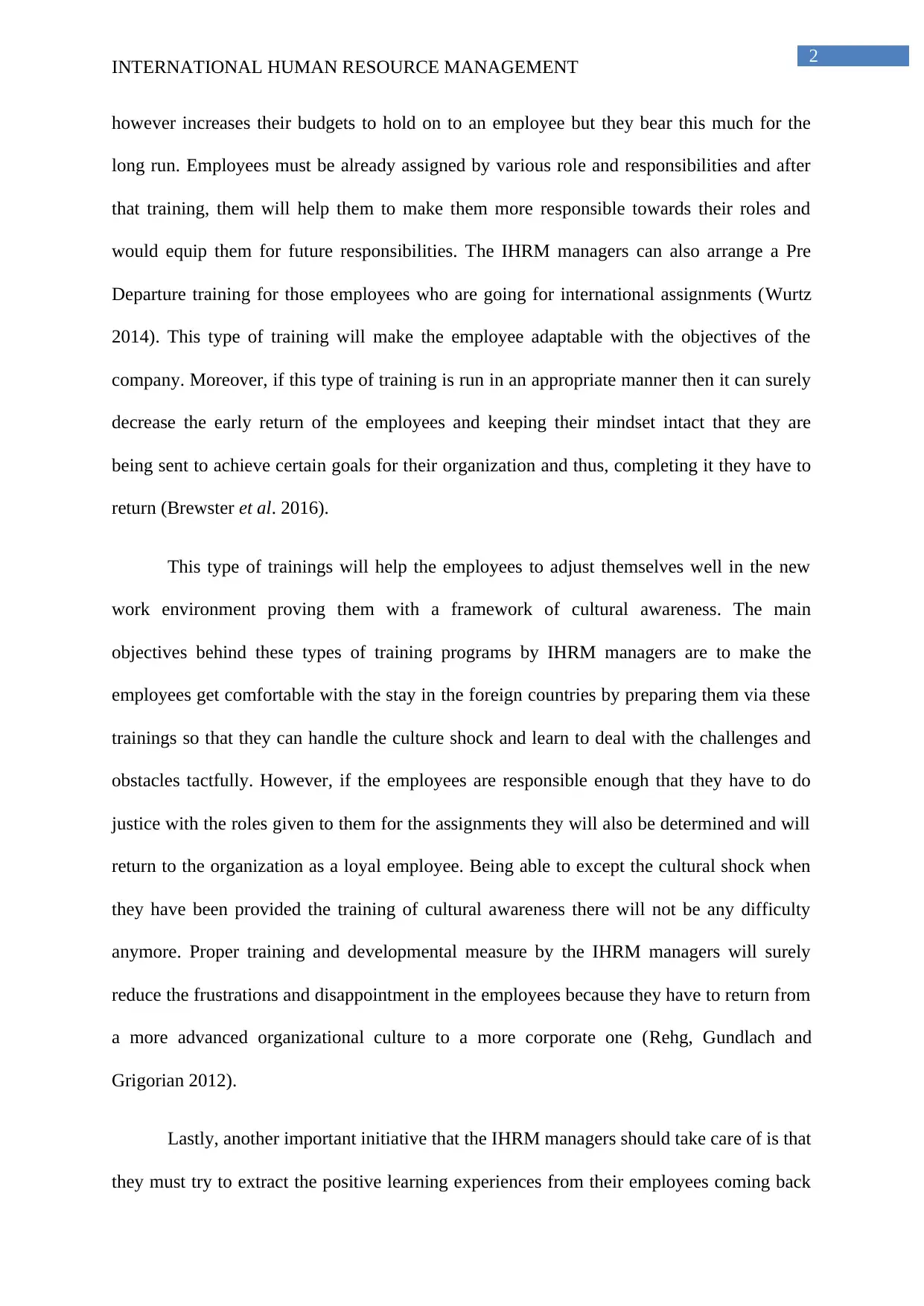
2
INTERNATIONAL HUMAN RESOURCE MANAGEMENT
however increases their budgets to hold on to an employee but they bear this much for the
long run. Employees must be already assigned by various role and responsibilities and after
that training, them will help them to make them more responsible towards their roles and
would equip them for future responsibilities. The IHRM managers can also arrange a Pre
Departure training for those employees who are going for international assignments (Wurtz
2014). This type of training will make the employee adaptable with the objectives of the
company. Moreover, if this type of training is run in an appropriate manner then it can surely
decrease the early return of the employees and keeping their mindset intact that they are
being sent to achieve certain goals for their organization and thus, completing it they have to
return (Brewster et al. 2016).
This type of trainings will help the employees to adjust themselves well in the new
work environment proving them with a framework of cultural awareness. The main
objectives behind these types of training programs by IHRM managers are to make the
employees get comfortable with the stay in the foreign countries by preparing them via these
trainings so that they can handle the culture shock and learn to deal with the challenges and
obstacles tactfully. However, if the employees are responsible enough that they have to do
justice with the roles given to them for the assignments they will also be determined and will
return to the organization as a loyal employee. Being able to except the cultural shock when
they have been provided the training of cultural awareness there will not be any difficulty
anymore. Proper training and developmental measure by the IHRM managers will surely
reduce the frustrations and disappointment in the employees because they have to return from
a more advanced organizational culture to a more corporate one (Rehg, Gundlach and
Grigorian 2012).
Lastly, another important initiative that the IHRM managers should take care of is that
they must try to extract the positive learning experiences from their employees coming back
INTERNATIONAL HUMAN RESOURCE MANAGEMENT
however increases their budgets to hold on to an employee but they bear this much for the
long run. Employees must be already assigned by various role and responsibilities and after
that training, them will help them to make them more responsible towards their roles and
would equip them for future responsibilities. The IHRM managers can also arrange a Pre
Departure training for those employees who are going for international assignments (Wurtz
2014). This type of training will make the employee adaptable with the objectives of the
company. Moreover, if this type of training is run in an appropriate manner then it can surely
decrease the early return of the employees and keeping their mindset intact that they are
being sent to achieve certain goals for their organization and thus, completing it they have to
return (Brewster et al. 2016).
This type of trainings will help the employees to adjust themselves well in the new
work environment proving them with a framework of cultural awareness. The main
objectives behind these types of training programs by IHRM managers are to make the
employees get comfortable with the stay in the foreign countries by preparing them via these
trainings so that they can handle the culture shock and learn to deal with the challenges and
obstacles tactfully. However, if the employees are responsible enough that they have to do
justice with the roles given to them for the assignments they will also be determined and will
return to the organization as a loyal employee. Being able to except the cultural shock when
they have been provided the training of cultural awareness there will not be any difficulty
anymore. Proper training and developmental measure by the IHRM managers will surely
reduce the frustrations and disappointment in the employees because they have to return from
a more advanced organizational culture to a more corporate one (Rehg, Gundlach and
Grigorian 2012).
Lastly, another important initiative that the IHRM managers should take care of is that
they must try to extract the positive learning experiences from their employees coming back
⊘ This is a preview!⊘
Do you want full access?
Subscribe today to unlock all pages.

Trusted by 1+ million students worldwide
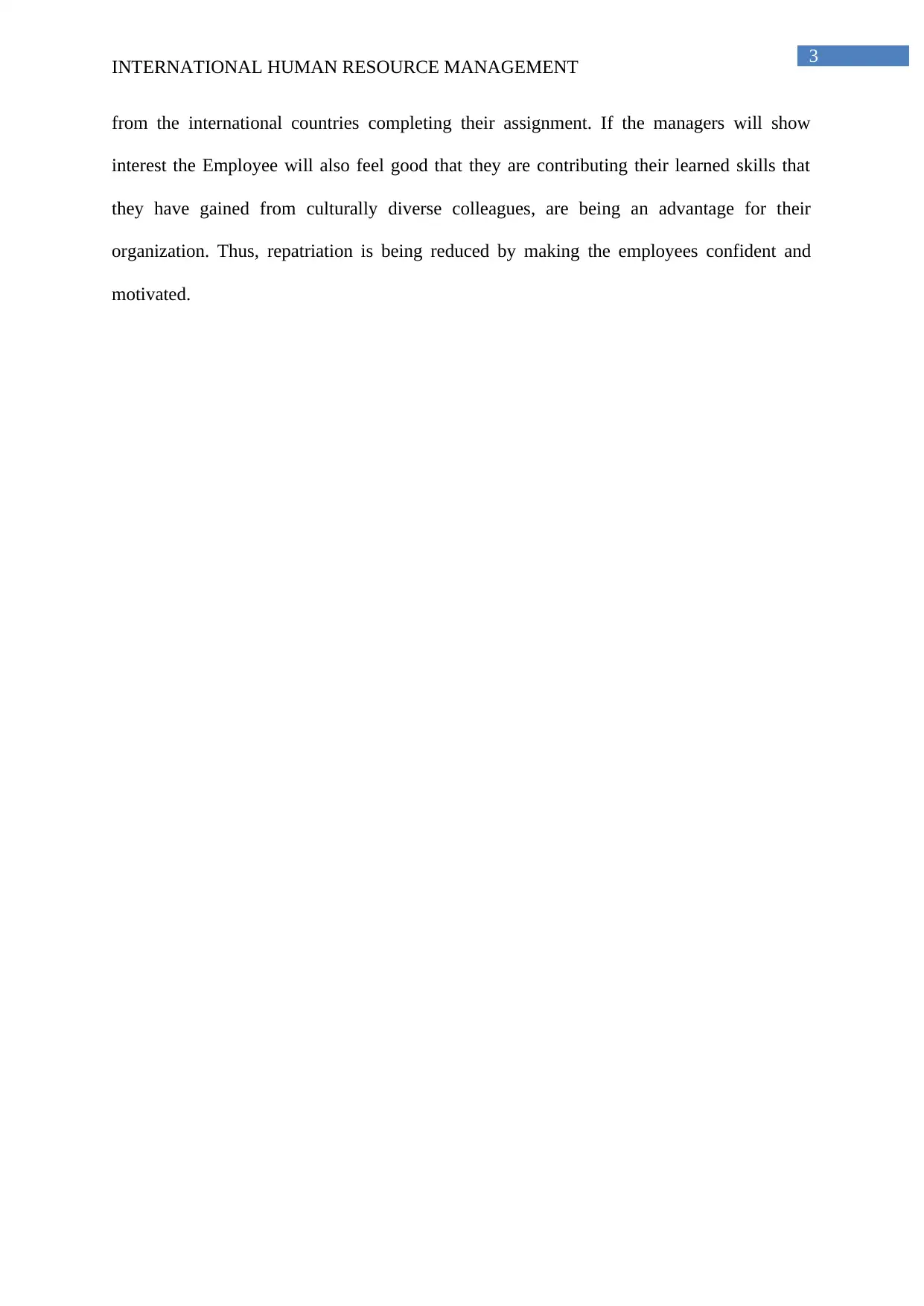
3
INTERNATIONAL HUMAN RESOURCE MANAGEMENT
from the international countries completing their assignment. If the managers will show
interest the Employee will also feel good that they are contributing their learned skills that
they have gained from culturally diverse colleagues, are being an advantage for their
organization. Thus, repatriation is being reduced by making the employees confident and
motivated.
INTERNATIONAL HUMAN RESOURCE MANAGEMENT
from the international countries completing their assignment. If the managers will show
interest the Employee will also feel good that they are contributing their learned skills that
they have gained from culturally diverse colleagues, are being an advantage for their
organization. Thus, repatriation is being reduced by making the employees confident and
motivated.
Paraphrase This Document
Need a fresh take? Get an instant paraphrase of this document with our AI Paraphraser
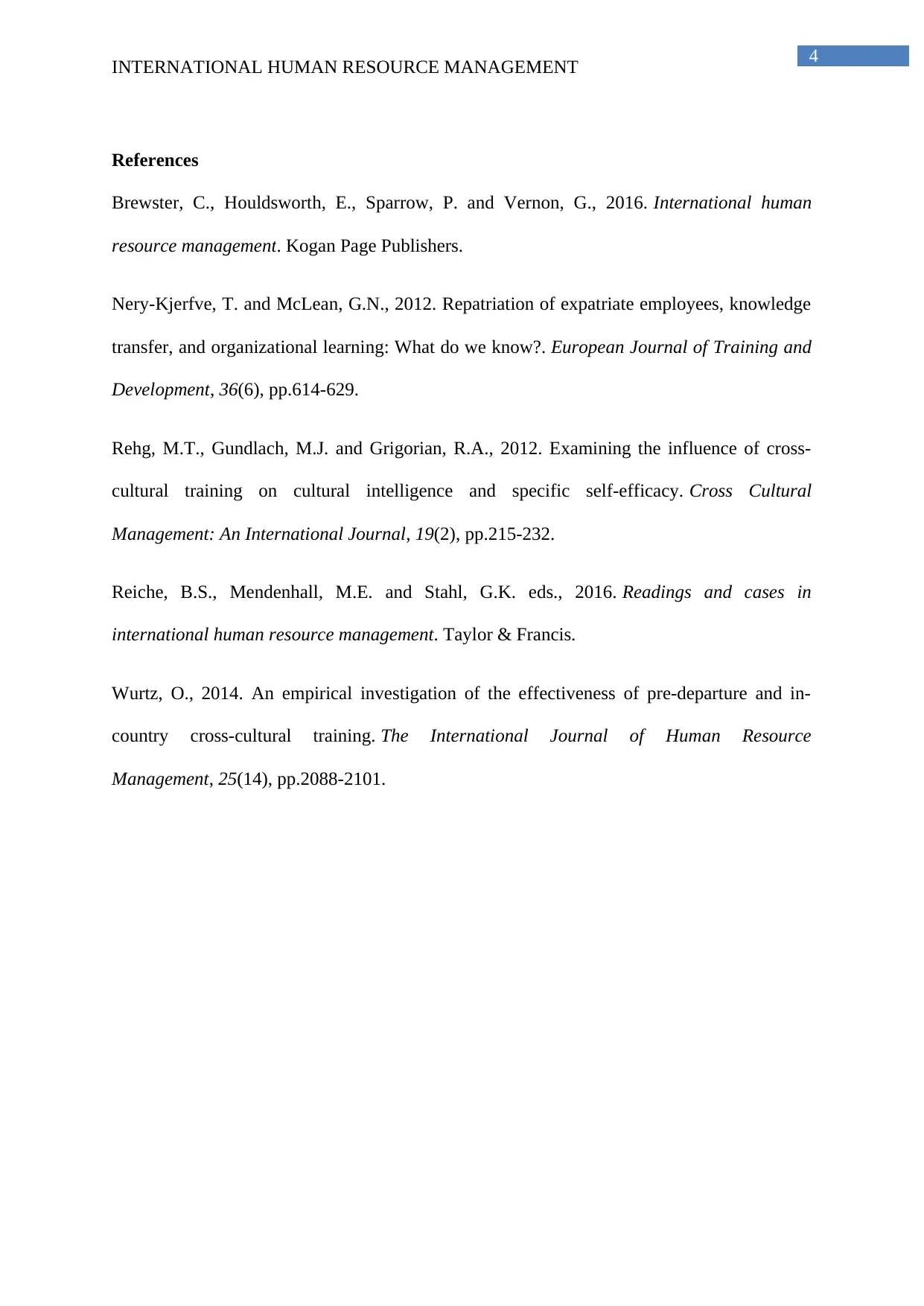
4
INTERNATIONAL HUMAN RESOURCE MANAGEMENT
References
Brewster, C., Houldsworth, E., Sparrow, P. and Vernon, G., 2016. International human
resource management. Kogan Page Publishers.
Nery-Kjerfve, T. and McLean, G.N., 2012. Repatriation of expatriate employees, knowledge
transfer, and organizational learning: What do we know?. European Journal of Training and
Development, 36(6), pp.614-629.
Rehg, M.T., Gundlach, M.J. and Grigorian, R.A., 2012. Examining the influence of cross-
cultural training on cultural intelligence and specific self-efficacy. Cross Cultural
Management: An International Journal, 19(2), pp.215-232.
Reiche, B.S., Mendenhall, M.E. and Stahl, G.K. eds., 2016. Readings and cases in
international human resource management. Taylor & Francis.
Wurtz, O., 2014. An empirical investigation of the effectiveness of pre-departure and in-
country cross-cultural training. The International Journal of Human Resource
Management, 25(14), pp.2088-2101.
INTERNATIONAL HUMAN RESOURCE MANAGEMENT
References
Brewster, C., Houldsworth, E., Sparrow, P. and Vernon, G., 2016. International human
resource management. Kogan Page Publishers.
Nery-Kjerfve, T. and McLean, G.N., 2012. Repatriation of expatriate employees, knowledge
transfer, and organizational learning: What do we know?. European Journal of Training and
Development, 36(6), pp.614-629.
Rehg, M.T., Gundlach, M.J. and Grigorian, R.A., 2012. Examining the influence of cross-
cultural training on cultural intelligence and specific self-efficacy. Cross Cultural
Management: An International Journal, 19(2), pp.215-232.
Reiche, B.S., Mendenhall, M.E. and Stahl, G.K. eds., 2016. Readings and cases in
international human resource management. Taylor & Francis.
Wurtz, O., 2014. An empirical investigation of the effectiveness of pre-departure and in-
country cross-cultural training. The International Journal of Human Resource
Management, 25(14), pp.2088-2101.
1 out of 5
Related Documents
Your All-in-One AI-Powered Toolkit for Academic Success.
+13062052269
info@desklib.com
Available 24*7 on WhatsApp / Email
![[object Object]](/_next/static/media/star-bottom.7253800d.svg)
Unlock your academic potential
Copyright © 2020–2026 A2Z Services. All Rights Reserved. Developed and managed by ZUCOL.




